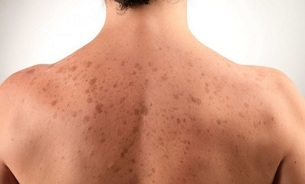With the development of modern medicine and many studies have been done, scientists have not been able to fully determine the true cause of the development of scaly lichen. Psoriasis is a disorder of the skin and tissues around the joints. The disease is characterized by a non-infectious course, with the appearance of papules and red spots, prone to melting. This formation is dry, scaly, rises above the surface of the skin and represents a localized chronic process. Microscopy reveals a large number of keratinocytes, cells of the immune system (T-lymphocytes and macrophages), with abundant vascular network growth.
Psoriasis and its causes, with the development of this drug, are being actively investigated, but no one has determined the final cause.
Scientists have identified several key foundations for the development of pathology:
- Genetics- hereditary theory of the appearance of psoriasis is based on the fact that if an ancestor or close relative has this pathology, the risk of its occurrence in the next generation is equal to 25% if one of the parents is ill. With the development of the disease in both parents, the risk of its occurrence in heredity increases to 70%. It is possible that a healthy child is born to a sick parent, but after a while, under the influence of the above factors, the disease develops on him.
- Immune defects- Examining the histological material of patients with psoriasis, scientists have revealed the accumulation of excessively diseased immune cells in the epidermal layer. At the same time, specific antibodies are found, and in the surface layer of the epidermis - Munro microabscesses (accumulation of fluid between cells, leukocytes, macrophages). General blood tests show an increase in the number of leukocytes (T helper), all of which discuss the nature of autoimmune disease.
- Virus lesions- in this case, this means infection with retrovirus. This tension introduces its own tRNA chain into host cells, replacing its genetic code with a virus. Which manifests itself in overproduction and multiplication of immature and indistinguishable dermis cells.
The interesting fact is that antipsoriatic treatment according to autoimmune theory aims to reduce the number of immune cells, including T-helper. With the presence of psoriasis in HIV / AIDS infected, the number of these cells decreases to the limit values, and the risk of developing psoriasis increases. Further investigation of this fact, can completely refute the autoimmune theory of the development of psoriasis.
Developmental factors of psoriasis

What causes psoriasis? There are several provoking factors that have a negative impact on the body:
- Stress- this factor is the trigger of psoriatic eruption and the last link, under the influence of reduced rash. This factor is one of the main ones, as the onset of psoriasis in 50% of cases occurs precisely due to overwork, psychological trauma and nervous tension. With the onset of psoriasis remission, any mental shock can lead to relapse;
- Infections- a group of diseases, with the development of the main focus of psoriatic rash appears. Such diseases include: all infectious diseases of the upper respiratory tract, bacterial and fungal infections affecting the skin, mononucleosis. In patients with psoriasis, the presence of an increased number of pathogenic microflora (beta-hemolytic streptococcus and Staphylococcus aureus) was determined. Candidiasis is a fungal infectious process in which psoriasis develops most often;
- External influences- a large number of patients attribute the appearance of psoriasis to external physical factors. Often it is: mechanical trauma to the skin, burns, hypothermia and frostbite;
- Endocrinopathy- this group of diseases is accompanied by dysfunction of the body as a whole. This factor is most often found in the female sex, due to changes in hormone levels that are frequently associated with growth, pregnancy, menstrual cycle, menopause. In patients with diabetes mellitus, metabolism is significantly disrupted, while persistent glucose uptake negatively affects human tissues and organs, provoking the development of other diseases;
- Toxins- acts as another cause of psoriasis on the body. Its appearance is associated with food poisoning, working in factories or factories, abuse of certain products (citrus fruits, coffee, chocolate). Alcohol and smoking, with its toxic effects, cause many diseases, including psoriasis;
- Pathogenetic effects includemedication intake.It is proven that a small number of patients begin to develop psoriasis while taking the following medications: NSAIDs, beta-blockers, fortified drugs (vitamins C, B, D), cytostatics, antibiotics (cephalosporins).
Prevention of psoriasis
Many factors contribute to the development of psoriasis. The basic theory has not been determined and preventive measures should be comprehensive, targeted comprehensively. Patients should reconsider their lifestyle. If necessary, change your place of residence to a more environmentally friendly area.
It is best to avoid stressful situations. Possibility to take antidepressants and sedatives. The diet should contain more fiber, fruits and vegetables without allergies, meat, fish. While treating the same pathology, it is very important to abandon bad habits, see a doctor about replacement therapy. Take a course of treatment in a specialized sanatorium.























